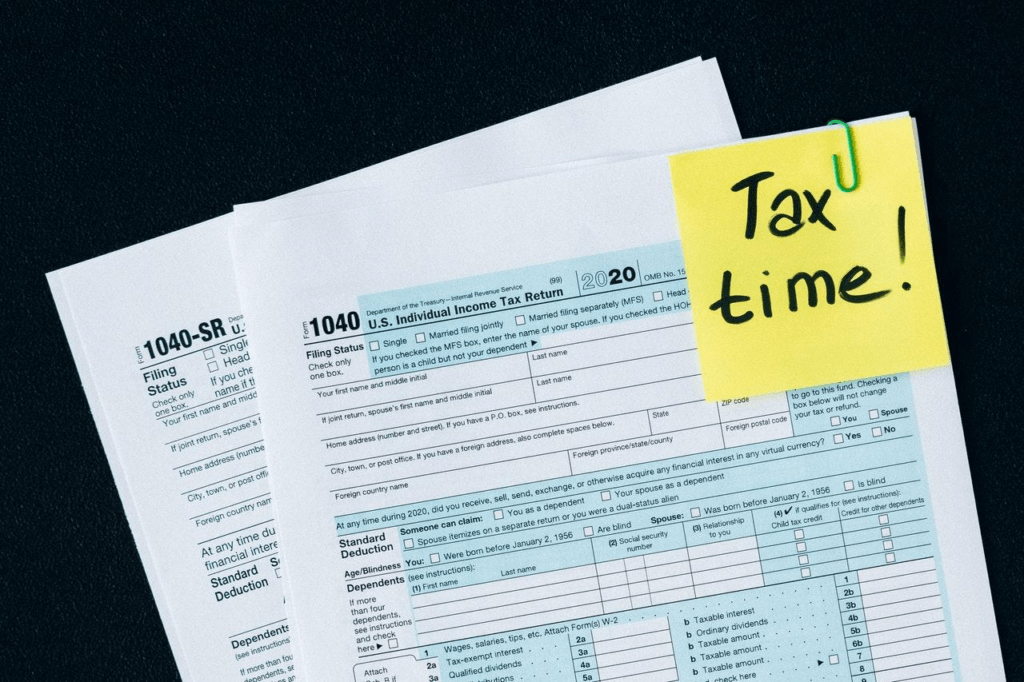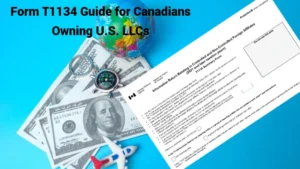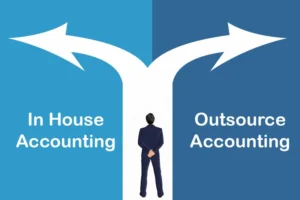Embracing the comfort of remote work from your home has its perks. However, it’s important to keep in mind that if you’re working remotely in Canada for a US-based company, there are certain tax complexities and challenges that you need to address.
Tax Implications: While remote work is a blessing, it’s essential to understand the tax implications to avoid any nasty surprises.
Working remotely in Canada for a U.S.-based company presents unique tax challenges. While Canada taxes residents on global income, the U.S.-Canada tax treaty helps prevent double-dipping by both tax authorities. To navigate this intricate landscape and optimize your financial position, it is necessary to be well-informed of the updated tax laws and legalities.
Table of Contents
- Is it possible to be working remotely from Canada for a US-based Company?
- The Landscape of Cross-Border Employment
- Tax Residency Status For Working Remotely in Canada
- Do I pay Canadian tax on US income?
- Social Security, Medicare, and Other Contributions
- Reporting Foreign Income When Working Remotely in Canada
- Do you pay US taxes if you are working remotely in Canada?
- Benefits, Drawbacks, and Financial Planning
- Legal Considerations Before you dream of the American dream
- Tips for Navigating the Tax Maze
- Future Outlook
- Conclusion
- FAQS

Is it possible to be working remotely from Canada for a US-based Company?
Yes, it is possible for you to be working remotely from Canada for a U.S.-based company. Many individuals opt for this work setup. However, it’s essential to understand the tax and legal implications involved.
You might be thinking, “Why not just enjoy the Canadian wilderness and work for a US company remotely?” Well, you’re not alone in that thought. Many Canadians are jumping on this bandwagon, but it’s essential to weigh the pros and cons.
- Benefits:
- Financial Flexibility: You might find that working remotely in Canada for a US company can be more lucrative. With the current exchange rates, your US dollar salary can stretch further in Canada.
- Diverse Opportunities: The US market is vast, and working for a US-based company can open doors to a plethora of opportunities and experiences that might not be available in Canada.
- Flexibility: A key advantage of remote work is the ability to enjoy flexible timings, providing individuals with greater control over their schedules.
- Risks:
- Tax Complications: As we shall discuss further, the tax implications can be a maze. You’ll need to be diligent in understanding both Canadian and US tax obligations.
- Legal Consequences: If not careful, you might find yourself in a pickle with legal issues. For instance, many companies hiring overseas contractors aren’t aware of the legal consequences of cross-border work relationships.
- Communication Barriers: Your team in the US might be in a different time zone as compared to yours. This can lead to communication challenges.
In conclusion, while working remotely from Canada for a US company as a Canadian resident has its perks, it’s not without its challenges.
The Landscape of Cross-Border Employment
Remember when working across borders was a James Bond thing? Well, times have changed, and now it’s all about Wi-Fi and tax forms.
- Historical Context: Once upon a time, cross-border work meant espionage. Now? It’s all about Zoom calls.
- Rise of Digital Nomads: By 2035, there’ll be 1 billion digital nomads worldwide. You’re just ahead of the curve!
- Employee vs. Freelancer: Are you a loyal knight or a freelance mercenary? Your tax situation differs accordingly. In the grand scheme of things, cross-border employment is the future. Just make sure you’re on the right side of the tax laws.
Tax Residency Status For Working Remotely in Canada
Before diving into the tax pool, you need to know if you’re swimming in the Canadian or American end when working remotely from Canada for a US company. Before you start counting your money, it’s essential to understand where you stand in the eyes of the taxman. Your tax residency status determines how you’ll be taxed, and trust us, you don’t want any surprises here.
- Definition: Tax residency isn’t about where you feel at home. It’s where the government says you owe them money.
- Criteria: If you spend over 183 days in Canada, congrats! You’re a tax resident. Pack your snow boots.
- Tax Treaty: The Canada-US tax treaty is like a prenup. The US-Canada tax treaty is a bilateral agreement designed to prevent double taxation and promote fair tax treatment for individuals and businesses operating across both countries by specifying rules for income taxation and determining tax residency. It decides who gets what. Bottom line: Know your tax residency status. It’s the compass that’ll guide your tax journey.
- Residential Ties: These are the connections you have with Canada. The stronger they are, the more likely you are a resident for tax purposes.
- Significant Residential Ties: These are the big ones. Having a home in Canada, a spouse or common-law partner in the country, or dependents living in Canada are all significant ties.
- Secondary Residential Ties: These might seem minor, but they add up. Things like having a Canadian driver’s license, passport, bank account, or even membership in Canadian organizations can be considered.
- Determining Your Residency Status: It’s not just about where you live, but how you live and the ties you maintain.
- Types of Residencies:
- Factual Residents: Even if you’re vacationing in Bali or working temporarily in the US, if you maintain significant residential ties with Canada, you’re a factual resident.
- Emigrants: If you’ve packed up, left Canada, and set up a new permanent home in another country, you might be considered an emigrant. This means you’ve severed most, if not all, of your residential ties with Canada.
- Deemed Non-Residents: This is a tricky one. You might still have strong ties with Canada, but if you’ve set up shop in a country that has a tax treaty with Canada and you’re considered a resident there, you’re deemed a non-resident for Canadian tax purposes.
- Government Employees Abroad: If you’re representing Canada abroad, whether as a government employee or a member of the Canadian Forces, you’re usually considered a factual or deemed resident of Canada.
- Why It Matters: Your residency status affects how you’re taxed.
- Residents: If you’re a resident of Canada, you’re taxed on your worldwide income. Yes, that includes the money you made selling your old snowboard on eBay.
- Non-Residents: As a non-resident, you’re only taxed on certain types of Canadian income. That US paycheck? Canada usually won’t touch it, but there are always exceptions.
In conclusion, your tax residency status is like your relationship status on social media – it’s complicated, and it matters. Understanding it is the first step to ensuring you’re not giving more to the taxman than you need to.
Do I pay Canadian tax on US income?
Yes, if you are working remotely in Canada for a US-based company, you are typically required to pay Canadian tax on your worldwide income, including that from the U.S. However, tax treaties may prevent double taxation. It’s crucial to consult a tax expert regarding Canadian tax implications.
Earning in dollars while spending in Canadian dollars when you’re working remotely from Canada may seem enjoyable, but it can lead to complexities during the tax season.
- Canadian Perspective: Canada loves its residents, especially when they earn abroad. Why? Taxes, of course!
- Federal and Provincial Taxes: You might be working for the US, but Canada wants its share.
- Tax Brackets: Depending on your income, you could give up to 53% to the Canadian government. (at least if you’re living in Ontario)
- US Perspective: Uncle Sam might reach out for his cut, especially if you’re earning big bucks.
- Withholding Taxes: The US might hold back some of your earnings. It’s like a forced savings plan, but less fun.
- Double Taxation: Paying taxes twice? Sounds like a nightmare, but there are ways around it.
- Tax Treaty Benefits: This treaty is your best friend. It ensures you aren’t taxed twice for the same income. In essence, while navigating the tax waters of two countries might seem daunting, with the right knowledge, you can sail smoothly.
Social Security, Medicare, and Other Contributions
Remember when you thought only grandparents talked about social security? Welcome to adulthood!
- US FICA Tax: If you’ve seen a deduction labeled FICA on your paycheck, that’s the US asking for its share for Social Security and Medicare.
- Canada’s CPP and EI: On the Canadian side, you’ve got the CPP and EI. It’s like FICA’s Canadian cousin.
- Totalization Agreement: This agreement ensures you’re not paying into both systems. It’s like a “buy one, get one free” deal, but for taxes. In the end, while juggling contributions might seem like a circus act, with a bit of guidance, you can ensure you’re not overpaying.
Reporting Foreign Income When Working Remotely in Canada

So, you’ve earned some US greenbacks. Time to let Canada know about your global adventures.
- Worldwide Income: Canada wants to know about every penny you earn, even if it’s from selling lemonade in Timbuktu. Whether you’re working for a US-based company, you can’t escape Canadian tax.
- Currency Conversion: Remember to convert your US earnings to CAD using the Bank of Canada’s annual rate. You do not have the choice of choosing your own favorable rates.
- Foreign Tax Credits: Foreign Tax Credits are akin to accolades for fulfilling tax obligations in a different country. Accumulating a sufficient number of these credits could potentially be used to counterbalance your Canadian tax liabilities. In essence, they acknowledge that you’ve already paid taxes elsewhere on income that is also subject to taxation in Canada, preventing double taxation and promoting fairness in the global taxation system.
To wrap up, reporting foreign income when working remotely for an American company
might seem tedious, but think of it as telling Canada about your financial travels. Just be honest; no one likes a tall tale!
Do you pay US taxes if you are working remotely in Canada?
If you’re a Canadian, considering a remote gig for a US-based company, here’s what the US might want from you:
- Income Reporting: If you earn over $10,300 from a US source, it’s time to let the IRS know. Every penny counts in their books when it comes to your working remotely from Canada.
- Tax Withholding: Brace yourself! US companies might withhold up to 30% of your pay for taxes. So, on a $50,000 annual salary, $15,000 could initially go to the IRS.
- Tax Treaties: The good news? The US and Canada have a tax treaty i.e. The US-Canada tax treaty! This means you won’t be taxed twice on the same income. You can claim a foreign tax credit on your Canadian return for taxes paid in the US.
- Filing Requirements: Paperwork alert! You’ll likely need to file a non-resident US tax return (Form 1040-NR). Over 23,000 Canadians took this route in 2019, so you’re in good company.
- Forms and Documentation: The W-8BEN and 1040NR are the tax forms you might need.
In a nutshell, while diving into US tax might initially seem as daunting as trying to understand curling rules, with the right info, it’s a breeze. And remember, when in doubt, a tax professional is your best friend. They’ll definitely help you navigate the tax maze!
Benefits, Drawbacks, and Financial Planning
Ah, the sweet taste of US dollars! But remember, every rose has its thorns, and in this case, it’s the prickly world of taxes.
- Pros: Earning in USD can be lucrative, especially with favorable exchange rates. You might just be the envy of your Canadian peers!
- Tax Challenges: Navigating two tax systems can feel like juggling flaming torches. Don’t get burned!
- Financial Planning: Planning for retirement? Considering buying a moose? Whatever your goals, cross-border financial planning is key.
- Retirement Considerations: Think about where you want to retire. Beaches of Florida or the Canadian Rockies? Your choice affects your tax future. In essence, while working for a US company has its perks, it’s essential to plan wisely to enjoy the fruits of your labor fully. Retirement Accounts:
- 401(k) and IRAs: If your US employer offers a 401(k) or you’re considering an IRA, there are tax implications to consider when you withdraw the funds in Canada.
- Canadian RRSP: If you have a Registered Retirement Savings Plan (RRSP) in Canada, the US recognizes it as a tax-deferred account, thanks to the tax treaty.
Legal Considerations Before you dream of the American dream
Being well aware of the legal implications of your actions is necessary. Before deciding to work remotely for an American company, you should have the following things in mind,
- Work Permits and Visas: Even if you’re working from your Canadian couch, the US might want some paperwork.
- Legal Rights: Know your rights as a remote worker. It’s not just about the paycheck but also about fair treatment.
- Contractual Considerations: Before finalizing a remote work contract, it is essential to carefully assess and address all relevant contractual considerations to ensure a mutually beneficial arrangement for both parties.
To sum it up, while legal jargon might give you a headache, it’s better than facing legal troubles down the road. Always be prepared.
Tips for Navigating the Tax Maze
Lost in the tax labyrinth? Don’t worry; we’ve got a map for you.
- Professional Advice: Consider hiring a cross-border tax professional. They’re like tour guides for the tax world.
- Record-Keeping: Keep your receipts and documents. Think of them as souvenirs from your financial travels.
- Staying Updated: Tax laws change more often than fashion trends. Stay in vogue by keeping up with the latest. In conclusion, while the tax world might seem like a maze, with the right tools and guidance, you can navigate it like a pro.
Future Outlook
Cross-border remote work is undoubtedly the future.
- Predictions: As remote work becomes the norm, cross-border collaborations will soar. You’re just a pioneer!
- Tax Law Changes: As governments catch up, expect changes in tax laws. Yes, more paperwork.
- Evolving Landscape: The only constant is change. Adapt, evolve, and stay ahead of the curve. In a nutshell, the future is bright for cross-border remote work.
Just be prepared with all the prior information by reaching out to our Chartered Professional Accountant today!
Conclusion
You’ve journeyed through the world of cross-border taxation, faced the dragons (tax forms), and emerged victorious. Or at least, more informed.
- Recap: From understanding tax residency to navigating legalities, you’re now equipped with knowledge.
- Proactivity: The key to a smooth tax experience is staying proactive. Don’t wait for tax season to scramble. In the end, knowledge is power. And with this power, you can conquer the tax world (or at least not get lost in it).
Always remember that you cannot track the complexities of the tax implications alone, and hence, must always refer to a cross-border tax accountant to avoid any inconvenience later.
FAQS
1-Do you pay US taxes if you work remotely in Canada?
It depends. You may have U.S. tax obligations if you’re treated as a U.S.-based employee. However, the U.S.-Canada tax treaty can provide relief from double taxation. If you’re working remotely, you have to file a treaty-based return to get a refund for all the taxes you paid to the IRS and then submit it to the CRA. Always consult a tax professional for specifics.
2-Can I work for a US company remotely from Canada?
Yes, you can work for a U.S. company remotely from Canada. However, you must address both U.S. and Canadian tax implications. Additionally, consider any work authorization or visa requirements.
3- How is working remotely for a US company taxed?
Working remotely for a U.S. company is taxed based on your residency status and location. U.S. citizens and resident aliens are taxed on worldwide income, regardless of where they work. Non-residents are typically taxed only on U.S.-sourced income.
4– Do I pay Canadian tax on US income?
Yes, if you are a resident of Canada, you are taxed on your worldwide income, including income from the U.S. However, to avoid double taxation, you can claim a foreign tax credit on your Canadian tax return for taxes paid in the U.S.






